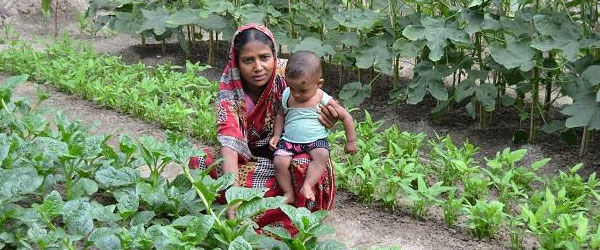Bangladesh
In Bangladesh, around two in five pre-school children are chronically malnourished

Photo credit: BRAC
COUNTRY CONTEXT
About two in five children under the age of five suffer from chronic malnutrition (stunting) in Bangladesh. Iron deficiency remains a major public health concern, affecting about half of pre-school children and pregnant women. A major reason for this alarming nutrition situation is the predominance of rice in people’s diets. Initially, government agricultural strategies and policies were focused on increasing food grain production, particularly rice, to ensure basic food security. This has resulted in a lack of diversity in people’s diets. The lack of diet diversity leads to micronutrient deficiencies, particularly in iron, zinc, vitamin A and iodine which can have serious health implications, including increased susceptibility to disease, blindness and death.
More recently however, the importance of balanced nutrition is being recognised in the policy sphere; It has been included as one of the core objectives in the National Food Policy in 2006 and is embedded in the associated Plan of Action 2008‐2015, with the objective of achieving adequate nutrition for all individuals, especially women and children. The government plans to invest in improving the nutrition situation with community based nutrition activities through livelihood approaches, which are complemented by health oriented awareness campaigns. To ensure food safety and improve food quality, a surveillance system of food borne illnesses will be strengthened. The government also finalised a Country Investment Plan in March 2011, which includes a set of 12 priority investment programmes to improve food security and nutrition in an integrated way.
WHAT IS LANSA?
Leveraging Agriculture for Nutrition in South Asia (LANSA) is a programme of research which aims to generate evidence that, with practical application, can improve nutrition outcomes in India, Bangladesh, Pakistan and Afghanistan. The research under LANSA will explore the fundamental, underlying and immediate determinants of nutrition.
LANSA RESEARCH IN BANGLADESH
BRAC is the lead institution for LANSA research in Bangladesh, working with the Leverhulme Centre for Integrated Agricultural Research (LCIRAH), the International Food Policy Research Institute (IFPRI) and the Institute of Development Studies (IDS). The primary goal is to promote agricultural development activities that establish a direct linkage between agriculture and nutrition so that policies and interventions by the government and non-government organisations explicitly address problems of malnutrition through agricultural development policies and strategies. In that alignment BRAC has been leading and collaborating on research projects under the three thematic pillars of LANSA.







